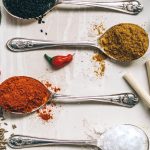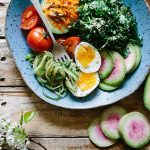Want to know a secret? Nature provides us with all the nutrients we need according to the time of year. As we enter fall, a time of transition from summer to winter, your body requires the right amount of nutrients, antioxidants and minerals to cope with the changes that come with this season.
Among the changes that autumn brings are lower temperatures, shorter days and less sunlight exposure. Getting less sun especially effects our health in the following ways:
- Your body produces less serotonin, which aids in your mood making you feel balanced and happy.
- Lower levels of melatonin; a hormone that helps you sleep better.
- A decrease in production of vitamin D, which is absorbed through your skin. Vitamin D is important for calcium absorption, your digestion and a strong immune system.
- In many people, less exposure to light can result in a higher risk of depression.
This shouldn’t be cause for worry though! Our bodies have evolved over the millenia so that we can obtain all these missing nutrients through our diet! Let’s take a look at nine seasonal fall foods that can help you boost your health throughout the cooler, darker days coming up.
1. Cashews To Beat The Blues
Nuts in general are rich in minerals and healthy fatty acids that can help you feel healthy and full. I recommend cashews since they helps build serotonin, one of the hormones that puts you in a good mood. These nuts are also rich in magnesium and vitamin B6 which help fight anxiety and depression. Just one fistful of cashews can be a great snack in the mid-morning or afternoon to fill you up and perk you up!
2. Probiotics
Probiotics are naturally occurring bacteria that help you with digestion, mood improvement and helping to strengthen your body’s defenses. It’s recommended to take them along with food so they can process the fibre and sugar you consume most efficiently. They come in a lot of different forms, like yogurt, fermented lactic beverages like kombucha, and even easy to eat gels and capsules that are dairy-free. Studies indicate that people who consume probiotics get sick less often and when they do the symptoms are usually less severe.
3. Gourds and Squashes
The classic Hallowe’en pumpkin couldn’t be absent from this list! Pumpkins are a part of the gourd family, which are rich in B-carotenes that boost your immune system and help keep your skin healthy when the low temperatures roll in. Spaghetti squash is a personal favourite, so named since you can eat it just like spaghetti! To pick the best gourds, make sure they are hard on the outside. without any soft or green spots. One of the best part is how versatile they are — you can bake, steam or even microwave them!
4. Plums
Plums are one of those rare fruits that are widely available at the beginning of the fall. Their colour is due to anthocyanin, which is a potent antioxidant related to cancer prevention. They are also an excellent source of potassium which is excellent for preventing high blood pressure and stroke risk.
5. Blackberries
Another fall fruit is the sweet and tangy blackberry! Blackberries are rich in antioxidants that can help prevent flu and similar respiratory diseases. Recent research has also suggested that they could be very helpful to control glucose levels and therefore preventing and controlling type 2 diabetes. Mix them with yogurt, add them to a smoothie or eat them alone as a snack.
6. Cabbage
Cabbage can be underestimated, but it is one of the healthiest and cheapest foods available. It’s super high in fibre and vitamin K which is very important for the blood clotting process. Cabbage is great as coleslaw, but can also be a great addition for soups and stews. Try mixing it with your favourite protein, soy or minced meat carrot, onions and spices. If you’re on the run, you can also roll up some of your favourite veggies or source of protein in cabbage leaves for a carb-free wrap!
7. Beetroot
The deep, rich wine-like colour of beetroots is due to a chemical called betacyanin. This is a powerful antioxidant that helps prevent several types of cancer. Beetroot is also very high in fibre, which helps reduce the risk of cardiovascular disease. If that isn’t enough they can also help build up white blood cells to increase your body’s defense mechanism.
8. Less Meat, More Mushrooms
Mushrooms contain healthy carbohydrates and minerals that can boost your health. Among the many benefits they provide are increased levels of vitamin D which helps absorb calcium, weight control and strengthening of the immune system. Mushrooms are also a great choice for your Meatless Mondays — so instead of that beef patty you can season a delicious Portobello mushroom to make a veggie burger or even add them to your favorite stew.
9. Figs
Try adding figs to your diet this fall and you’ll be obtaining vitamin A, E and K, and minerals like potassium and manganese. They are also very rich in soluble fibre and prebiotics which maintain the healthy gut flora to protect you against disease, improve your digestion and even help prevent constipation. They can be great for snacks or you can add them to your salad.
Roll Out Your Fall Menu!
These are just nine foods that are ready to be consumed in the fall and can be a great addition to your plate. One way to introduce these into your diet, especially if you’ve never used them before, is to choose one ingredient and plan your meal around it. Giving variety to the foods you eat not only keeps things interesting, but they diversify the nutrients flowing into your body so you get a little bit of everything! Do you know any delicious recipes using any of these foods? Share them with us in the comments below.













